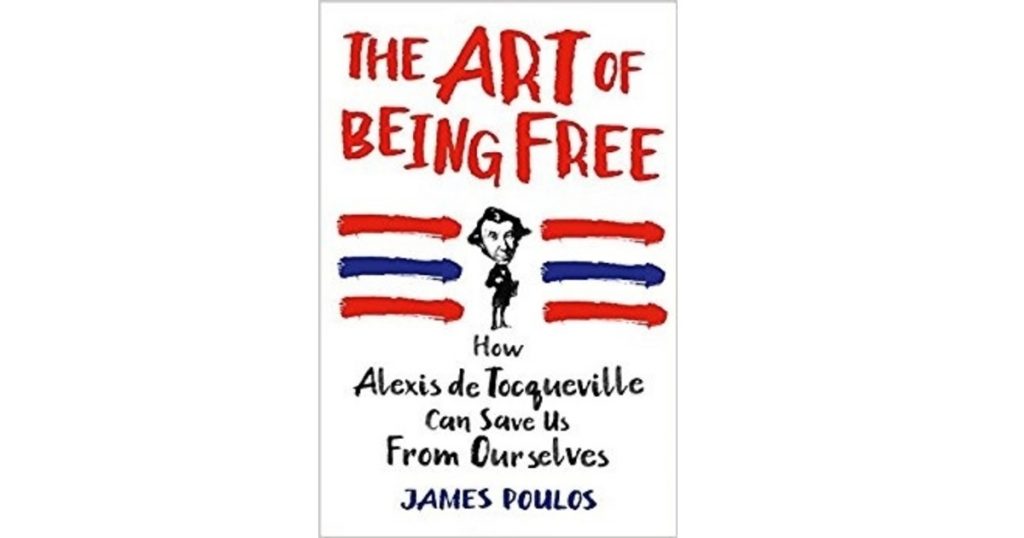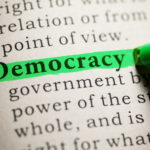Few teach democracy better than Monty Python. In their film, Life of Brian, a first-century false messiah tells his followers to think for themselves. “Yes, we are all individuals!” the crowd chants together. “Yes, we are all different!” One man objects, “I’m not.” He’s promptly shushed.
It’s a scene Alexis de Tocqueville could have written. Resemblance, not difference, maddens Americans, yet most writers emphasize disparities in our society rather than our equality. Too few note the deep concord simmering just beneath the surface: we are all individuals, but we do not know what to do about it. We are naturally bad at being free.
If it cannot come naturally, then freedom must be cultivated by art. So argues James Poulos, columnist for the Daily Beast and The Week and contributing editor of American Affairs, in The Art of Being Free. He rearticulates Tocqueville’s thesis: American mores run deeper than status differences, and that drives us crazy. Brimming with political theory and popular culture analyses, his book blends Tocqueville, Plato, and Hamlet, with Batman, Seinfeld, and Christian Bale films. His diagnosis succeeds, though, as we’ll see, his prognosis could be more hopeful and less deferential to Democracy in America.
Poulos and Tocqueville
Start your day with Public Discourse
Sign up and get our daily essays sent straight to your inbox.With an eclectic résumé as ex-law student, Los Angeles rock musician, and Georgetown doctoral candidate, Poulos left academia for journalism. His recent essays discuss Plato on trigger warnings, how anti-heroism causes psychopathology, why Peter Thiel is a Nietzschean, and the fact that we’re “losing liberty in an age of access.”
Taking his cue from Rieff, Lasch, and Bellah, critics of the “me-generation,” Poulos says we inhabit a “Pink Police State.” Its health and safety regulations micromanage rootless individuals who pay rent for easy access to certain lifestyles rather than own property in communities. Before, local associations channeled our ambitions. Now, a therapeutic state provides a libertine playpen for us, the patients.
In Plato’s Republic, Socrates says a doctor who treats bodies merely manages symptoms, while a doctor who treats souls ameliorates the causes of madness. Pink Police Officials emulate the first doctor. Tocqueville emulates the second. The democratic problem is rootlessness, and a good political scientist like Tocqueville examines the unrooted hearts of people.
This malaise occurs in democracies, not aristocracies, Tocqueville explains. Aristocracies create lovers of nobility in hierarchical roles. Democracies create people who love to say, “We are all individuals.” Modern democracy arose when the religious equality of souls became the political equality of citizens. An abstract devotion to humanity replaced particular feudal devotions as commerce eroded local neighborliness. Like Linus, the democrat says, “I love mankind. It’s people I can’t stand.”
Loneliness, although now easier, remains avoidable. Two alternatives are available: isolation under a Pink Police State or freedom in local self-government. Democratic souls naturally separate from each other, but they can also deliberately associate. Tocqueville saw in America this art of being free. Poulos hopes we can relearn it.
Between Nature and Art
Poulos, like Tocqueville, depicts the Puritans as adventurous but sober Americans. Our Puritan parents rejected the politics of our aristocratic grandparents but retained their Protestantism. Puritan mores introduced into the New World political rights and townships, combined with piety and churches. Liberty and religion moderated each other. Despite the loneliness of leaving home, the Puritans’ faith in Providence produced the courage and forbearance they needed to create a new one.
The virtues of parents, however, sometimes degenerate into vices in children. Self-governance in one generation becomes its parody in the next. As Poulos interprets Plato’s Republic, “things that rule our hearts determine who rules” and “degenerate from generation to generation.” Tyranny progressively overtakes a free city whose generations mistake partial goods for the Good.
A similar degeneration, Poulos thinks, occurred with us. The Puritans’ political daring was religiously disciplined. Mentally fenced in by faith and morals, they experimented in law, economy, and geography because the other areas of life, whether constitutions or frontiers, were open wilderness for innovation and settlement. But combining audacity and restraint is an art, while pink servitude comes naturally. Now, we parody our ancestors by taking their partial goods as ways of life. Their urge to build a City upon a Hill was balanced with patience and hope for the world to come. A chastened pursuit of happiness linked self-interest to township and worship. But self-interest isn’t always well-understood. In imitating industry and temperance, we oscillate between obsession for well-being and nihilistic exhaustion.
Today, Americans want the best deals in our wages, pastimes, and marriages. We desire what it takes to express ourselves. Every material and spiritual value is maximized. Yet we all start to look more alike. Our appetites may differ, but they still rule us. The art of the deal, it seems, is not the art of democracy. Tired from the rat race, we collapse in exhaustion.
This oscillation—from overactive work, play, and sex to social isolation—illustrates democratic manic depression, Poulos argues. We seek repose but badly mimic the Puritans’ rest on the Sabbath. “Our forebearers [sic] understood Jesus to have told them take the wheel,” Poulos says, while we reenact the driver from Fight Club, whom Tyler Durden tells to “let it go.” And we crash.
With frequent ’90s pop culture references, Poulos shows that our entertainment manifests this craziness. The ironic normalcy of Seinfeld, a show famously about nothing, masks the nihilism of “The Dude” Lebowski. The Coen Brothers’ Nietzschean Last Man embodies the meme declaring “lol nothing matters”: Lebowski chills on his couch, sips a White Russian, wears pink jelly sandals, and admires his rug. Mistake Seinfeld for moderation, and you discover the Dude. “Mistake complete passivity for total freedom,” Poulos says, and you discover oblivion.
Solipsism or Community
Selves differ from persons, Poulos says. Selves are identities crafted in our heads and publicly performed. Persons are embodied souls with minds, wills, and passions. Selves are playacting. Persons are actors.
Contemporary Americans, Poulos says, act “crazily, selfishly, and melodramatically.” Dangerously, we try curing madness on our own rather than in communities of kindred spirits. We imitate Hamlet, at one moment privately brooding, at the next killing Polonius. His soliloquies cultivate insanity: “I, the son of a dear father murder’d, / Prompted to my revenge by heaven and hell, / Must, like a whore, unpack my heart with words.” Against this cyclical madness, we remain irreducibly free to create new associations. Meditative solipsism may be our default, but with faith we may come home together. Perhaps the medicine for our American madness is in our Puritan’s Genesis: it is not good for man to be alone.
Whoever saves his self loses his reason, but whoever loses his self for others finds his person. We relent from having it all by living for others. Here, Poulos contrasts Hamlet the self with Batman the person. Prince Hamlet cannot decide to act knightly or knavishly; Batman is a prince who became a knight. Wayne darkened his identity, mastered himself, and spent his inheritance to protect Gotham—in a crisis of identity, this aristocrat became a democrat.
In his diagnosis of Dude Lebowski, Poulos quotes The NeverEnding Story’s tagline: “A boy who needs a friend finds a world that needs a hero.” Batman is the never-ending story of American democracy—a man who needs his father but finds a city that needs a hero.
After discussing this civic service inspired by familial loss, Poulos ends his very (discursively) personal book with a letter to his son on fatherhood, a question underlying Batman and the Puritans. Despite public opinion, he tells Nikos, a son needs his dad. Otherwise, he is like an American slave who, Tocqueville says, “is left in suspense between two societies and isolated between two peoples.” In a free nation, mothers and fathers teach their children how to live freely.
Diagnosis and Prognosis
Poulos understands ill-at-ease Americans. Yet drawing too exclusively from Democracy in America, his prognosis limits our moral resources. Though he seems to take Tocqueville to be providing a complete account of human nature, this was not Tocqueville’s aim.
Often, Tocqueville says that different thoughts come naturally to different souls, but he usually refrains from saying which thoughts are true. Tocqueville says, for instance, that “to force all men to march with the same step, toward the same purpose, that is a human idea.” This idea comes naturally to democratic man. However, “to introduce an infinite variety in actions, but to combine them so that all these actions lead by a thousand paths toward the accomplishment of a great design, that is a divine idea.” This idea comes naturally to aristocratic man.
We democrats recollect this divine idea in the practice of achieving shared ends through manifold means. Attuned by his Catholicism to how the Body of Christ mediates God and man, Tocqueville saw how institutions mediate state and citizen in the experience of American federalism. He warns against comprehensive systems, an idea natural to democrats but foreign to aristocrats. In denying most aristocratic insights to Americans, Poulos ironically commits himself to what both he and Tocqueville consider erroneous, a closed philosophical system.
Specifically, he levels American art with his Tocquevillean lens, critiquing medieval analogies between nature and grace, both in Rod Dreher’s book How Dante Can Save Your Life and especially in Terence Malick’s film Knight of Cups. The latter features Christian Bale as a wanderer who, plagued by familial pain, tours LA parties with girlfriends until he finds salvation—in a Beatrice figure, critics note. He is a lost prince rescued by divine love.
Poulos counters: knights, courts, and heavenly hierarchies are “only broken analogies to an irrevocable era dangling like chains . . . this delusion of grandeur leads not to enchantment but disenchantment.” Amelioration with friends, not salvation in lovers, is better suited to democratic imaginations. His target is the premodern understanding that this life, whether politically or religiously, imitates eternal verities. As Poulos says elsewhere, “the experience of friendship can illuminate political liberty in a way that traditional appeals to religion and politics have failed to do.”
But this dichotomy between the democratic and the aristocratic, between friendship and divine love, is false. Tocqueville certainly thought that Americans need to learn from aristocrats. For models of civic virtue, he recommends reading ancient writers like Plutarch because they, unlike moderns, teach men to act freely. Even Ralph Waldo Emerson calls Plutarch’s Parallel Lives “a bible for heroes” to be read alongside Homer, King Arthur, and other premodern stories. Aristocrats can educate democrats in politics—that is the guidance of Virgil. Likewise for religion: the aching for homecoming in these aristocratic authors teaches that all fathers and sons share a spiritual home—that is the guidance of Beatrice. Discounting these insights leaves a democratic man like Tocqueville’s slave, in isolated suspense between two societies. Dante needs more than equals.
Thankfully, Americans have another source of moral capital beyond Puritan equality: Southern chivalry. In this “ancient Stoicism reconciled with modern or Evangelical Christianity,” Peter Lawler notes, our “best citizens are otherworldly believers who manage to be rather seamlessly both magnanimous and charitable.” By grace, Americans remain “stuck with virtue.” Americans have several virtues by which to live freely; to think otherwise is a human idea. But it is a divine idea to look upward, beyond our equality of conditions, to see that there is much more, but not much new, under the sun.
Poulos commendably applies Tocqueville to Americans today, but to paraphrase one writer, to love Democracy in America well, it is necessary to love it moderately. If we are to honor the faith of our fathers amid this modern malaise, it is well to remember that refusals to look upward enable a Pink Police State just as much as refusals to look at each other.














